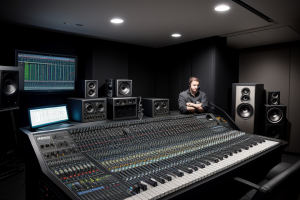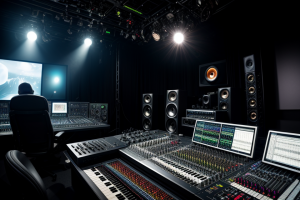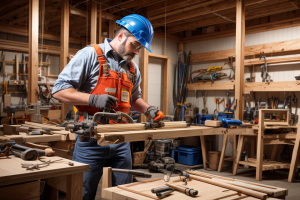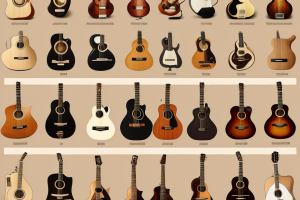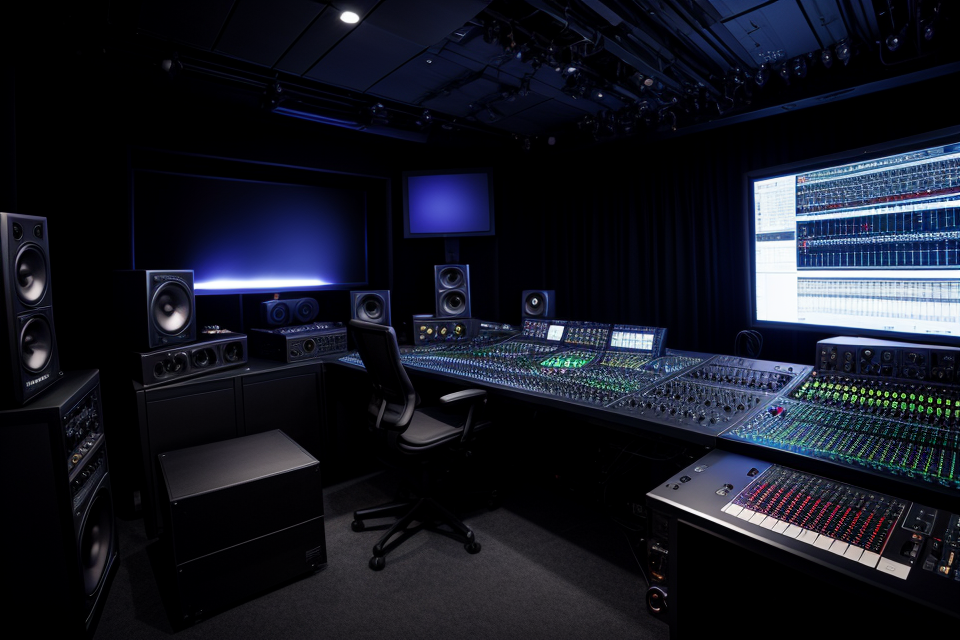
Sound engineering is the art and science of creating, recording, manipulating, and reproducing audio. It involves the use of equipment, software, and techniques to produce high-quality sound for various applications, including music, film, television, and live events. The sound engineer is responsible for ensuring that the audio is clear, balanced, and meets the creative vision of the project. They work closely with musicians, filmmakers, and other professionals to achieve the desired sound effects and music. Sound engineering is a challenging and rewarding field that requires technical expertise, creativity, and attention to detail.
The Role of a Sound Engineer
Responsibilities and Tasks
As a sound engineer, the primary responsibility is to record, mix, and master audio content for various media platforms, including film, television, music, and live events. This role requires a comprehensive understanding of sound engineering principles, as well as proficiency in sound editing software and equipment.
The tasks associated with this role are multifaceted and require a high level of technical expertise, creativity, and collaboration. Here are some of the key responsibilities and tasks of a sound engineer:
Recording and Mixing Music and Sound Effects
The sound engineer is responsible for capturing and mixing audio content for various projects. This involves using specialized equipment, such as microphones, mixers, and digital audio workstations (DAWs), to record and mix music and sound effects. The engineer must have a keen ear for sound quality and be able to adjust levels and balance frequencies to create a cohesive and polished audio experience.
Adjusting the Levels and Balancing the Frequencies
Sound engineers must be able to adjust levels and balance frequencies to create a high-quality audio experience. This involves using a variety of tools, such as equalizers and compressors, to enhance specific frequencies and adjust the overall volume of the audio. The engineer must be able to listen critically to the audio and make adjustments to ensure that it sounds balanced and natural.
Using Sound Editing Software and Equipment
Sound engineers must be proficient in using a variety of sound editing software and equipment. This includes digital audio workstations (DAWs), microphones, mixers, and other specialized equipment. The engineer must be able to use these tools to edit and manipulate audio content, add effects, and create a polished final product.
Collaborating with Directors, Musicians, and Other Professionals
Sound engineers often work as part of a team, collaborating with directors, musicians, and other professionals to create high-quality audio content. This requires strong communication skills, as well as an ability to understand and execute the creative vision of the project. The engineer must be able to work effectively in a team environment, providing input and suggestions when necessary, and ensuring that the final product meets the needs of the project.
Skills Required
- Knowledge of Music and Audio Principles: A sound engineer requires a solid understanding of the fundamental principles of music and audio production. This includes knowledge of sound waves, frequency, dynamics, and the physics of sound.
- Attention to Detail and Critical Listening Skills: Sound engineering involves a great deal of attention to detail. A sound engineer must have a keen ear for detecting even the slightest nuances in sound. Critical listening skills are essential for ensuring that the final output is of the highest quality.
- Technical Expertise in Sound Equipment and Software: A sound engineer must have a deep understanding of the technical aspects of sound equipment and software. This includes knowledge of microphones, mixers, amplifiers, and digital audio workstations (DAWs). The engineer must be able to operate and maintain this equipment to ensure that it functions properly.
- Creative Problem-Solving Abilities: Sound engineering is not just about technical expertise; it also requires creativity and problem-solving skills. A sound engineer must be able to think outside the box and come up with innovative solutions to challenges that arise during the production process. This might involve finding ways to overcome technical limitations or coming up with new ideas for enhancing the sound of a project.
Overall, the role of a sound engineer requires a unique combination of technical knowledge, artistic sensitivity, and problem-solving skills. A successful sound engineer must be able to navigate the complexities of audio production and use their expertise to bring out the best in each project they work on.
Sound Engineering in Different Contexts
Film and Television
As a sound engineer in the film and television industry, your primary responsibility is to capture and manipulate audio to enhance the viewing experience. This involves recording dialogue, foley, and sound effects, and working closely with the director and production team to ensure that the audio complements the visuals.
One of the key skills required for success in this field is the ability to use digital audio workstations (DAWs) and other software to edit and manipulate audio. DAWs are software programs that allow sound engineers to record, edit, and mix audio tracks. They are an essential tool for sound engineers in the film and television industry, as they allow for precise control over the timing and volume of audio tracks.
In addition to DAWs, sound engineers in film and television also use a variety of other software tools to enhance the audio quality. For example, they may use noise reduction software to remove unwanted background noise, or they may use equalization software to adjust the frequency response of audio tracks.
Another important aspect of sound engineering in film and television is the ability to work well with others. Sound engineers must be able to communicate effectively with the director and other members of the production team to ensure that the audio meets their needs. They must also be able to work well under pressure, as film and television productions often have tight schedules and deadlines.
Overall, sound engineering in film and television requires a combination of technical skills, creativity, and collaboration. By mastering these skills, sound engineers can help bring stories to life and create a more immersive viewing experience for audiences.
Live Events
Setting up and operating sound systems for concerts, theater, and other performances
A sound engineer in a live event setting is responsible for the setup and operation of sound systems that provide audio for concerts, theater performances, and other live events. This includes selecting and positioning speakers, sound reinforcement equipment, and mixing consoles to achieve optimal sound quality.
Managing sound levels and monitor feedback
One of the primary responsibilities of a sound engineer in a live event setting is to manage sound levels to ensure that the audience can hear the performance clearly while preventing sound distortion or feedback. This requires careful monitoring of sound levels and adjusting them as needed to maintain optimal sound quality.
Working with artists and production teams
A sound engineer in a live event setting works closely with artists and production teams to understand their audio requirements and preferences. This includes setting up microphones and other audio equipment for performers, adjusting sound levels during the performance, and addressing any audio issues that may arise. Sound engineers must also work closely with lighting and other production teams to ensure that the audio and visual elements of the performance are well-coordinated.
Music Production
Recording and Mixing Music Tracks
The role of a sound engineer in music production is critical in ensuring that the final product is of high quality. One of the primary tasks of a sound engineer is to record and mix music tracks. This involves capturing the audio performance of musicians and instrumentalists using high-quality microphones and recording equipment. The sound engineer must ensure that the recording is done with the best possible quality, taking into account factors such as the room acoustics, the positioning of the microphones, and the type of equipment used.
Once the recording is complete, the sound engineer must then mix the tracks to create a cohesive and balanced sound. This involves adjusting the levels of each instrument and vocal, adding effects such as reverb and delay, and ensuring that the overall mix is balanced and clear. A skilled sound engineer must have a good ear for music and be able to work closely with the producer and musicians to create a sound that is both technically excellent and aesthetically pleasing.
Editing and Enhancing Recordings
Another key task of a sound engineer in music production is editing and enhancing recordings. This can involve removing unwanted noise or background sounds, correcting issues with timing or pitch, and adding effects such as EQ or compression to improve the overall sound of the recording. Sound engineers must have a deep understanding of audio editing software and be able to use it effectively to enhance the quality of the recording.
In addition to editing, sound engineers may also be responsible for adding additional sounds or instruments to a recording. This can involve using synthesizers or other electronic instruments to create new sounds, or layering additional vocal or instrumental tracks to add depth and complexity to the recording. A skilled sound engineer must be able to work creatively with the producer and musicians to develop a sound that is unique and engaging.
Collaborating with Musicians and Producers
Finally, a sound engineer in music production must be able to collaborate effectively with musicians and producers. This involves understanding the creative vision of the producer and working closely with the musicians to capture their performance in the best possible way. A sound engineer must be able to communicate effectively with both the producer and the musicians, providing technical expertise and creative input as needed.
In addition to technical skills, a successful sound engineer in music production must also have a deep understanding of the creative process and be able to work collaboratively with others to create a final product that is both technically excellent and artistically satisfying. This requires strong communication skills, a willingness to listen to others, and a commitment to excellence in all aspects of the production process.
Tools and Techniques Used by Sound Engineers
Equipment
In the field of audio production, the right equipment is essential for producing high-quality sound recordings. Sound engineers rely on a variety of tools to achieve the desired results. In this section, we will take a closer look at some of the key pieces of equipment used by sound engineers.
Microphones and Recording Devices
Microphones are one of the most critical pieces of equipment for sound engineers. They are used to capture sound and convert it into an electrical signal that can be recorded and manipulated. There are many different types of microphones, each with its own unique characteristics and uses. Some of the most common types of microphones used in audio production include:
- Dynamic microphones: These microphones are known for their ability to handle high sound levels without distortion. They are often used for live performances and recording loud instruments such as drums and electric guitars.
- Condenser microphones: These microphones are sensitive to sound and are often used for recording vocals and acoustic instruments. They require phantom power to operate, which is provided by the mixing console or audio interface.
- Ribbon microphones: These microphones are known for their warm and natural sound. They are often used for recording vocals and acoustic instruments, particularly in the case of classical music.
In addition to microphones, sound engineers also use recording devices to capture sound. These devices come in many different forms, including digital audio workstations (DAWs), tape recorders, and portable digital recorders.
Mixing Consoles and Audio Interfaces
Mixing consoles and audio interfaces are essential tools for sound engineers. They are used to mix and balance multiple audio signals, as well as to route signals to and from other pieces of equipment.
Mixing consoles are typically used in recording studios and live sound settings. They allow sound engineers to control and adjust multiple audio signals at once, including adjusting the levels of individual tracks, adding effects, and controlling the overall balance of the mix.
Audio interfaces, on the other hand, are used to connect the recording device to the computer. They allow sound engineers to record and edit audio on a computer, as well as to connect other pieces of equipment such as microphones and instruments.
Digital Audio Workstations (DAWs) and Other Software
Digital audio workstations (DAWs) are software programs that allow sound engineers to record, edit, and mix audio on a computer. They provide a wide range of tools and features, including multi-track recording, editing, and mixing, as well as a variety of effects and virtual instruments.
In addition to DAWs, sound engineers also use a variety of other software tools to enhance and manipulate audio. These include compression, EQ, reverb, delay, and other effects, as well as mastering software to finalize the audio production process.
Overall, the right equipment is essential for sound engineers to produce high-quality audio recordings. By understanding the different types of equipment available and how to use them effectively, sound engineers can achieve the desired results and create exceptional sounding recordings.
Techniques
Sound engineers use a variety of techniques to enhance the quality of audio recordings. Some of the most common techniques include:
- Equalization (EQ) and compression: EQ and compression are two of the most commonly used techniques in audio production. EQ is used to adjust the levels of specific frequencies in a recording, while compression is used to reduce the dynamic range of an audio signal. These techniques are often used together to create a more balanced and cohesive sound.
- Reverb and delay effects: Reverb and delay effects are used to add depth and dimension to a recording. Reverb creates a sense of space by simulating the reflections of sound off of surfaces, while delay creates a repetition of the original sound. These effects can be used to enhance the ambiance of a recording or to create a unique sound.
- Recording and mixing tips and tricks: Sound engineers also use a variety of tips and tricks to improve the quality of their recordings. These may include using high-quality microphones and preamps, positioning microphones correctly, and using EQ and compression to enhance the clarity of individual instruments or vocals. Additionally, sound engineers may use techniques such as parallel compression and sidechaining to create a more dynamic and engaging mix.
Challenges and Opportunities in Sound Engineering
Technological Advancements
Sound engineering has undergone significant technological advancements in recent years. The emergence of new software and hardware has provided sound engineers with more tools to produce high-quality audio. However, keeping up with these advancements can be challenging and requires continuous education and professional development.
New Software and Hardware Developments
One of the most significant technological advancements in sound engineering is the development of new software and hardware. Digital audio workstations (DAWs) have become the industry standard for music production, providing sound engineers with a comprehensive suite of tools to record, edit, and mix audio. DAWs offer a wide range of features, including multitrack recording, real-time editing, and virtual instruments, which enable sound engineers to produce professional-quality audio.
Hardware developments have also played a significant role in the advancement of sound engineering. For example, digital signal processing (DSP) algorithms have been integrated into hardware devices such as effects processors and equalizers, allowing sound engineers to shape the tone and character of audio signals with greater precision. Additionally, advancements in microphone technology have led to the development of high-quality condenser microphones, which are capable of capturing a wide range of frequencies with high accuracy.
Keeping Up with Industry Trends and Standards
As technology continues to evolve, it is essential for sound engineers to keep up with industry trends and standards. This requires continuous education and professional development to stay current with the latest software and hardware developments. Sound engineers must also be familiar with industry standards such as the Digital Audio Workstation Standard (DAW) and the Digital Audio Broadcast Standard (DAB), which ensure compatibility and interoperability between different systems.
Continuing Education and Professional Development
Continuing education and professional development are critical for sound engineers to stay competitive in the industry. This can involve attending workshops, seminars, and conferences, as well as pursuing certifications and degrees in sound engineering. Additionally, many sound engineers participate in online communities and forums, where they can share knowledge and stay up-to-date with the latest trends and developments in the field.
In conclusion, technological advancements have played a significant role in the evolution of sound engineering. Sound engineers must stay up-to-date with the latest software and hardware developments, as well as industry trends and standards, to produce high-quality audio. Continuing education and professional development are essential for sound engineers to remain competitive in the industry and stay current with the latest advancements in sound engineering technology.
Collaboration and Creativity
In the world of sound engineering, collaboration and creativity are essential skills for success. Working with diverse professionals and artists requires effective communication, problem-solving, and the ability to adapt to different styles and approaches.
Here are some ways in which sound engineers can balance the technical and creative aspects of sound design:
- Building relationships: Sound engineers must develop strong relationships with artists, producers, and other professionals in the industry. This involves understanding their vision, goals, and expectations, and finding ways to collaborate effectively to achieve them.
- Experimentation: Sound engineers must be willing to experiment with new techniques and technologies to create innovative and engaging sound experiences. This requires a willingness to take risks, try new things, and learn from failures.
- Aesthetic considerations: While technical proficiency is essential, sound engineers must also have an understanding of aesthetic considerations such as tone, texture, and timbre. These elements can have a significant impact on the overall sound experience and must be carefully considered.
- Balancing technical and creative aspects: Sound engineers must strike a balance between technical and creative aspects of sound design. This requires a deep understanding of both the technical aspects of audio production and the creative process involved in producing music and other audio content.
By embracing collaboration and creativity, sound engineers can contribute to the development of innovative and engaging sound experiences that resonate with audiences and leave a lasting impact.
FAQs
1. What is a sound engineer?
A sound engineer is a professional who specializes in the technical aspects of audio production. They are responsible for ensuring that the audio produced for movies, television shows, music recordings, live events, and other media is of high quality and meets the desired standards.
2. What does a sound engineer do?
A sound engineer’s job is to manage the audio production process from start to finish. This includes tasks such as setting up and operating audio equipment, mixing and editing audio tracks, and troubleshooting any issues that may arise during the recording or production process. They work closely with directors, producers, musicians, and other professionals to ensure that the final product meets their vision and requirements.
3. What skills do I need to become a sound engineer?
To become a sound engineer, you need to have a strong technical background and a good understanding of audio equipment and software. You should also have excellent problem-solving skills, be able to work well under pressure, and have excellent communication skills to work effectively with other professionals in the industry. Familiarity with music and the recording process is also important.
4. What education do I need to become a sound engineer?
While formal education is not always required to become a sound engineer, many professionals in the field have at least a bachelor’s degree in audio engineering or a related field. There are also specialized programs and courses available that can provide training in specific areas of audio production.
5. What equipment do sound engineers use?
Sound engineers use a variety of equipment to produce high-quality audio. This includes microphones, audio mixers, digital audio workstations (DAWs), effects processors, and other specialized equipment depending on the project’s requirements.
6. What is the difference between a sound engineer and an audio engineer?
The terms “sound engineer” and “audio engineer” are often used interchangeably, but they can refer to slightly different roles in the industry. A sound engineer typically focuses on the technical aspects of audio production for live events and film/television, while an audio engineer may work on a broader range of projects, including music production and product development.
7. How do I become a successful sound engineer?
To become a successful sound engineer, you need to have a strong technical background, excellent problem-solving skills, and the ability to work well under pressure. Building a strong network of industry contacts and gaining practical experience through internships or entry-level positions can also help you to establish yourself in the field. Continuing education and staying up-to-date with new technologies and techniques is also essential for success.
